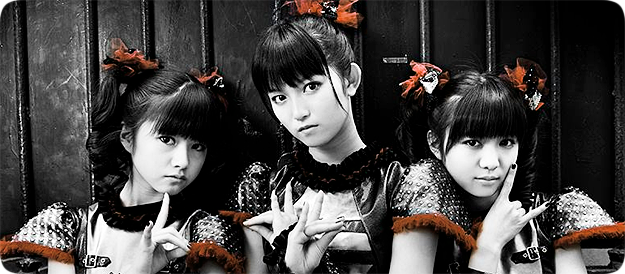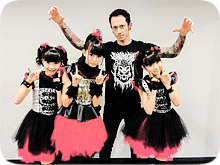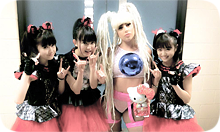
Marty Friedman was both right and wrong: J-pop idols are pretty amazing, and he emphasized this point when he enthused that “all the stuff I introduced to you from Japan is going to make it outside of Japan, and soon. I’m surprised it hasn’t happened already. I’m talking this year, or next year something is going to explode because this stuff is too good.” Four years later, we’re seeing a tiny, almost barely-perceptible fissure in the musical landscape. Perfume is successfully touring Europe and North America, adding major cities to their stops over time, while metal idols BABYMETAL are catering to both the LOLJapan crowd, and prurient hipsters, ever on the prowl for the new and different. The latter is nowhere more telling then their appearance in the entertainment issue of this week’s New Yorker, buried in the back in the teenage tastemakers article, Teenage Dream, by Matthew Trammell.
“Teen-agers with their serial rebellions, romantic infatuations, and unabashed experimentalism, have proved to be adept at reworking pop’s core provocations. Technology, meanwhile, has made it easy for teens to inject their aesthetics into the mainstream, with or without the guiding hand of managers and record labels.” (70)
 That last point is a stretch, and none of the artists briefly profiled could be considered to have gained “mainstream” success (Rappers Novelist and Kodak Black, piano prodigy Joey Alexander, popster Låpsley, etc.), but the New Yorker wouldn’t be the New Yorker if it didn’t purport to being on the absolute up-and-up. As in TIME‘s special Fall 2001 issue, which featured Hikaru Utada, (notably, she was working on her American debut with Foxy Brown and the Neptunes and planning to retire very young, around 28, probably to become a neuroscientist), articles like these tend to be peak Western exposure for said artists, rather than the beginning of a phenomenon, though BABYMETAL does get relatively considerable space. Writes Trammell,
That last point is a stretch, and none of the artists briefly profiled could be considered to have gained “mainstream” success (Rappers Novelist and Kodak Black, piano prodigy Joey Alexander, popster Låpsley, etc.), but the New Yorker wouldn’t be the New Yorker if it didn’t purport to being on the absolute up-and-up. As in TIME‘s special Fall 2001 issue, which featured Hikaru Utada, (notably, she was working on her American debut with Foxy Brown and the Neptunes and planning to retire very young, around 28, probably to become a neuroscientist), articles like these tend to be peak Western exposure for said artists, rather than the beginning of a phenomenon, though BABYMETAL does get relatively considerable space. Writes Trammell,
“Though the songs are addictive, Babymetal’s sharpest asset is its singular combination of J-pop’s theatrical pageantry and metal’s primal sprint. Adherents of each genre are becoming fans: Babymetal has enjoyed huge success in Japan, and its fame is growing in the United States and in London. […] Babymetal’s act, like much of the best pop, is at once recognizable and profoundly new.” (78)
This is a singularly Western explanation; in fact, for fans of J-pop, young teenage girls dancing and singing in a genre they never heard of, or downright dislike, is nothing new, and has been done, often, if not, arguably, better, by Japanese idol groups before them. The “profoundly new” angle is only new to American pop, where metal remains the domain of a largely male demographic. This, too, was true in Japan, until a meeting of the minds pinpointed a great way to sell idols units to otaku male audiences (the, ahem, most important, ones) and their skeptical friends even quicker: by making young female idols the mouthpieces of a traditionally “masculine” genre, they created the jarring allure and unexplored juxtaposition of teenage girls belting out aggressive metal songs, and lured fans’ wallets with something they could enthuse about publicly. This opened the idol business to even more mainstream revenue: suddenly it was just a little less unseemly for young and older men alike to collect posters and photo cards, attend handshake events, and attend concerts to see their idols because the music wasn’t soft rock or bubblegum pop: it was heavy and authentic and respectable and composed by real virtuosos of the genre with immeasurable skill and talent. While the genre (here, idol pop as an all-encompassing umbrella term) has always had both male and female fans, the female fans tend to be outliers: female idols, especially those who are front women for increasingly edgier hard rock or metal music, are first and foremost catered to a male audience, most especially an older male audience, who has the buying power to keep up with the sale of related merchandise. Female fans are the superfluous extra perks, a welcome byproduct, but hardly the target, which is why you get a lot of lyrical content that is usually either a) specific to men’s interests, especially, as the market saturates, super-niche interests — see Momoiro Clover Z — or b) specific to what boys and men think girls think, talk, and daydream about.
There are very few actual female idol groups marketed to girls and women, and most of them aren’t pure idols, skirting the broader definitions that prefer terms like girl group, or dance group, like E-girls or Fairies. Female fans are steered in the direction of Johnny’s idols, where young boys and men release softer, more heartfelt, treacly pop music, the type women are typically assumed to like: photoshoots present male idols as nonthreatening, cute, and cuddly, and their singles and albums reinforce this. While a crop of new K-pop-imitators like Da-iCE and Choshinsei, are struggling to redefine the preconceived notions of idol boy bands, they are still the exception, outnumbered by their best-selling rivals. Even groups like EXILE, KAT-TUN, and lately NEWS, lean toward heavy dancepop at its most aggressive; another genre traditionally undervalued in the critical world.
 In many ways this is a sign of the outrageous gender binaries that comprise the marketing and distribution of Japanese idols; for purposes of the music itself, it also reinforces the notion that genres that comprise huge male audiences (hard rock, metal) can be deemed authentic and worthy of critical attention, while those that women enjoy are considered fluff that no one would ever take seriously. Under that idea, it’s hardly surprising that a group like BABYMETAL could make it in the circles of certain American subcultures, and less so that articles in the Western media feel the need to justify their interest in the group by constantly reminding readers that their material was written by veterans of the metal genre (Nobuki Narasaki, Herman Li, Sam Totman, Takeshi Ueda, etc.), or that the girls themselves are influenced, or appreciated by, everybody from the members of Metallica to Slayer. There are few that don’t, and in many ways, these men serve to legitimize their existence. Under these caveats, it’s hard to imagine an equivalent Japanese male group/boy band (who don’t write their own music or play instruments) could make it stateside, not even if like Jimi Hendrix came back from the dead to write an album for them. Because it seems to be acceptable, if not preferable, for women to be mostly muses and good-looking faces for the music, a group like Perfume can get a lot of critical praise because of their music producer Yasutaka Nakata, but it rarely goes the other way for boy bands, who can’t seem to catch a break unless they’re more in control of their music and image, for example G-Dragon of K-pop group BIG BANG.
In many ways this is a sign of the outrageous gender binaries that comprise the marketing and distribution of Japanese idols; for purposes of the music itself, it also reinforces the notion that genres that comprise huge male audiences (hard rock, metal) can be deemed authentic and worthy of critical attention, while those that women enjoy are considered fluff that no one would ever take seriously. Under that idea, it’s hardly surprising that a group like BABYMETAL could make it in the circles of certain American subcultures, and less so that articles in the Western media feel the need to justify their interest in the group by constantly reminding readers that their material was written by veterans of the metal genre (Nobuki Narasaki, Herman Li, Sam Totman, Takeshi Ueda, etc.), or that the girls themselves are influenced, or appreciated by, everybody from the members of Metallica to Slayer. There are few that don’t, and in many ways, these men serve to legitimize their existence. Under these caveats, it’s hard to imagine an equivalent Japanese male group/boy band (who don’t write their own music or play instruments) could make it stateside, not even if like Jimi Hendrix came back from the dead to write an album for them. Because it seems to be acceptable, if not preferable, for women to be mostly muses and good-looking faces for the music, a group like Perfume can get a lot of critical praise because of their music producer Yasutaka Nakata, but it rarely goes the other way for boy bands, who can’t seem to catch a break unless they’re more in control of their music and image, for example G-Dragon of K-pop group BIG BANG.
Setting aside the gender breakdown of the critical music sphere for a second, any writer putting together an article about BABYMETAL deserves applause, since nothing gives away their idol-ness more than an interview, where stock quips and rehearsed nothings are the order of the day. Says Moa Kikuchi, when asked about the international reach of their fans, “Everyone loves music. I think music is the common language of the world. Music is a wonderful connection for all people – it brings people together.” These are hardly the insights of seasoned performers, though it speaks to their unique perspective, both as teenagers and Japanese teens, which they are very quick to take pride in (Yui Mizuno: “BABYMETAL music is a blend of hard music and metal music with Japanese pop and sounds. If we were not from Japan, we’d be a totally different band with totally different fans”).
 While Marty Friedman believed that Japanese pop music would only reach an audience outside Japan “with luck” and “timing,” and other factors that couldn’t be planned, BABYMETAL, has been a slow, methodical climb to relevance, not least of which included shows in Paris, New York, and the UK, and opening for Lady Gaga’s ArtRave: The Artpop Ball tour starting back in 2014. Noisey did a brief introduction back in the same year, while Jake Cleland at Pitchfork picked “Gimme Choco!!” as one of his favorite tracks of 2010-2014. All said and done, BABYMETAL, originally conceived of as a subunit of uber-traditional idol group Sakura Gakuin, has done well for itself, and not just because of luck and timing.
While Marty Friedman believed that Japanese pop music would only reach an audience outside Japan “with luck” and “timing,” and other factors that couldn’t be planned, BABYMETAL, has been a slow, methodical climb to relevance, not least of which included shows in Paris, New York, and the UK, and opening for Lady Gaga’s ArtRave: The Artpop Ball tour starting back in 2014. Noisey did a brief introduction back in the same year, while Jake Cleland at Pitchfork picked “Gimme Choco!!” as one of his favorite tracks of 2010-2014. All said and done, BABYMETAL, originally conceived of as a subunit of uber-traditional idol group Sakura Gakuin, has done well for itself, and not just because of luck and timing.
In fact, idol groups like BABYMETAL flourish in Japan, many of them far superior to the group, who are getting the attention and accolades that many Japanese idols simply don’t care about, or can’t be bothered with. PASSPO☆, in particular, has some of the highest quality, and variety, of hard rock and metal on their albums, especially on the legendary One World, and last year’s Beef or Chicken? Other examples include BAND-MAID, Momoiro Clover Z, and BiSH, all bands that might be considered too niche to crossover in America (it would surely involve a lot of context and explanation).
 That being said, in rare cases the music can transcend context, as BABYMETAL’s fantastic new album, METAL RESISTANCE, does. There are some truly epic and astounding risks the album takes and pulls off, particularly with lead tracks “KARATE” and the mostly-instrumental “From Dusk Till’ Dawn.” As Ryotaro Aoki points out in his review, the album has “more nods to 1980s hair metal and symphonic metal, which are perhaps more suited for mixing with J-pop than metal’s edgier subgenres” and fulfills “the crux of idol music; they know what you like, and they can convincingly make it exactly the way you like it.” It will be interesting to see how long BABYMETAL can sustain their novelty act in a country where trends come and go, Japanese pop culture is not often taken seriously, and the majority reaction is still more laugh-at-them than laugh-with-them (to be fair, homegrown girl groups aren’t having it much easier, even as they look to edgy K-pop for inspiration, but Fifth Harmony and Little Mix, bless their souls, are trying). While seeing the girls on Stephen Colbert was pretty exciting, simply appearing on late night portends nothing; just ask Girls’ Generation. The goal is always that music from other parts of the world can be appreciated and enjoyed for what it is and what it’s trying to do, rather than fit a predetermined, acceptable mold, regardless of which audience it’s attracting and why, and at least in that sense, BABYMETAL are chipping away at America’s icy heart proudly, and on their own terms.
That being said, in rare cases the music can transcend context, as BABYMETAL’s fantastic new album, METAL RESISTANCE, does. There are some truly epic and astounding risks the album takes and pulls off, particularly with lead tracks “KARATE” and the mostly-instrumental “From Dusk Till’ Dawn.” As Ryotaro Aoki points out in his review, the album has “more nods to 1980s hair metal and symphonic metal, which are perhaps more suited for mixing with J-pop than metal’s edgier subgenres” and fulfills “the crux of idol music; they know what you like, and they can convincingly make it exactly the way you like it.” It will be interesting to see how long BABYMETAL can sustain their novelty act in a country where trends come and go, Japanese pop culture is not often taken seriously, and the majority reaction is still more laugh-at-them than laugh-with-them (to be fair, homegrown girl groups aren’t having it much easier, even as they look to edgy K-pop for inspiration, but Fifth Harmony and Little Mix, bless their souls, are trying). While seeing the girls on Stephen Colbert was pretty exciting, simply appearing on late night portends nothing; just ask Girls’ Generation. The goal is always that music from other parts of the world can be appreciated and enjoyed for what it is and what it’s trying to do, rather than fit a predetermined, acceptable mold, regardless of which audience it’s attracting and why, and at least in that sense, BABYMETAL are chipping away at America’s icy heart proudly, and on their own terms.
(Photo credit.)
Some good points made but this really bothered me:
I like to listen to a lot of different music to try to find new stuff that i have like and as part of that i have listened to a lot of Japanese music, including idol music, for a long time. I have never liked a band or group’s music anywhere NEAR as much i like BABYMETALs music.
Saying that you think Passpo or Momoiro Clover Z’s music is just as good or superior is fine, opinions are opinons. But i think it’s pretty obvious that someone who like BABYMETALs music wouldn’t necessarily be interested in those groups musical output.
I have never been a fan of those groups, Passpo is just kind of bland and toothless and MCZ has always felt actual songwriting has always been secondary to delivering moments that feel like a producer/songwriter is elbowing me going: “Eeeh, eeh? See what i did there? Isn’t it clever? Isn’t it weird?”(also toothless in it’s audio production).
Then later the Japan Times review is quoted:
If that is the case then why have i, someone who has listened to A LOT of idol music, never liked a groups music anywhere nearly as much as i like BABYMETALs music?
To think of them as “just another idol group” and their music as just “idol music” that just happened to gain some traction outside of Japan is to me a very big mistake.
You bring up a lot of good points. This post is obviously full of my opinions, and therefore I expect there are people who will not agree with me. If you don’t think PASSPO or Momoiro Clover Z’s music is better than BABYMETAL’s, then great! It’s understandable and I can’t argue with that.
I have to agree with you that a lot of idol music isn’t that great and BABYMETAL’s is, while not as great as some, also better than other’s. But even if I didn’t think that, that would be okay — it’s just my opinion. I can’t speak to the quote of Aoki’s review of the album, as those are his words and not mine, but I think that a lot of idol groups are based on their specific angle and the marketing of it. Based on that angle they HAVE given you exactly what you, and what other fans want, which is, in this case, everything that BABYMETAL is and stands for. And it clicked, ergo, they have tons of fans, including you. Other idol groups cater to THEIR specific demographic, delivering things those audiences want. For a long time, I also dismissed idol music, until I found a few groups that finally clicked with me. In that sense, those groups also gave me what I was looking for. There’s such a variety of groups out there, I think a lot of people would be hard-pressed not to find at least one that they liked (assuming you enjoy J-pop to begin with).
I don’t think their music is just like every other idol group’s, rather my post was focused on how the tools that record labels and publicists use apply to ALL idol groups, whatever that niche it. They might be singing metal music, or anime-pop, or ballads, but finding their audience will essentially involve the same rules and tactics. What BABYMETAL is not, is organic — it’s right there in their oft-quoted story about how they didn’t even know what metal was until they joined the agency and were selected. For their agencies, these girls are largely interchangeable: they could have been selected to be in the punk group MARIA or scouted for BiSH or any other idol group, and they would have brought the same professionalism and enthusiasm to that group. Because of that, a lot of times I believe that you can look at the two separately: the idols and their agencies and then critically at the music, which, while it is a function of the way the group is marketed, exists on a different plane, written, composed, arranged, and produced by other people. Looking at the two together is useful and interesting too, I just didn’t happen to do that here.
Thank you for taking the time to comment, and I hope my response made some sense. I always welcome critique, discussion, and opinions!
I wouldn’t want to speak for him, but YOU decided to quote him. 😛
Anyway… That quote is about “Idol _MUSIC_” specifically. And i think BABYMETALs music really is “profoundly new” and should not be thought of as just “idol music”. No-one makes the sort of hard-edged, hard-hitting metal mixed with Pop sensibilities and Idol influences that BABYMETAL makes(at least that i have heard).
To be clear, i don’t dislike a higher percentage of Idol music than i do music from bands and other kinds of artists. I also don’t dislike Idol music just because it’s Idol music(although i do think many idol groups have a disadvantage, i’ll get to that later).
I think it’s a bit misguided to try to connect BABYMETAL to those tactics as BABYMETAL doesn’t sell photobooks, posters, photo cards or tickets to handshake events. BABYMETALs primary(and almost their only) products are their music and their live shows and it shows in how much care they put in to them to try to perfect them and differentiate them from what anyone and everyone else is doing, idol groups, pop singers and metal bands alike.
In the case of BABYMETAL, this really isn’t the case though. BABYMETAL was built around the girls, they are not there to fill generic “idol goes here” slots. That means they don’t have the disadvantage that many idol groups have that i mentioned earlier:
They can build the songs and choreography not just around the girls strengths and weaknesses but also to a degree around their personalities. Idol groups that can’t rely on members staying has to build songs and choreography around a sort of “lowest common denominator”, limiting the possibilities.
I disagree in this case. I think a big part the BABYMETAL girl’s professionalism and enthusiasm comes from the fact that they were taught and trained in Sakura Gakuin.
KOBAMETAL and many of the people involved with Sakura Gakuin behind the scenes seem to have backgrounds in the world of bands and as such i think this gives them a different way of thinking than most idol groups management.
That is exactly what is needed for BABYMETAL as that separation doesn’t really exist. There are a number of really good KOBAMETAL interviews out there, you should look them up. Really interesting insights into how songs are developed, BABYMETALs popularity, what he thinks of the girls and lots of other stuff.
Thank you for your time and i am sorry if i am replying to some of your more general statements about Idols as if they are specific references to BABYMETAL, I am pretty tired. 😛
I also hope the quotes don’t break…
Honestly, I had a very hard time following any translated interviews with KOBAMETAL. To me, it just furthered the extent this person was willing to go for the gimmick, especially when constantly referring to the “Fox God” to answer any questions. For example, “Every course of action taken by Babymetal is revealed to them via divine messages that come through the god of metal we called the Fox God” and, “We all call them the Chosen Ones, as it was the choice of the Fox God.” This doesn’t actually tell me anything about how or why these girls came to be in the group, that is, unless you also truly believe the Fox God chose them. Clearly, I do not. That’s from this interview.
This one is more interesting. Here he is talking about the reality behind how the girls were chosen: ” I wanted to produce from scratch, find the talented, train and promote them. So I looked around from high point of view. […] So I went to their recitals and did some auditions, where one of current member of Babymetal applied. I made a business plan, made presentations, managements showed some interest, and it began.” Basically, he wanted to form a group so he did what any other manager does: he scouted talent through auditions and picked the girls he thought would best represent his vision. Then he put that vision into a business proposal that promised to make people money and signed a contract that would bind him into doing so. Just like other idol agencies. He goes on to say he looked for young girls with cute looks, and dancing and singing ability. Again, nothing different there.
Yes, I do agree that BABYMETAL’s music is exceptional, and spoke about how great the album was in my post. I think it helps that KOBAMETAL is clearly a huge metal fan and his love for the genre shows. But I still think that other idol groups are making music in a similar style — that being metal and hard rock, not metal as BABYMETAL does metal. Whether they have been successful or not is a matter of personal taste and opinion.
I will, however, agree with you that they didn’t use some other traditional publicity techniques: no tie-ins with anime, for example, or handshake events. They relied a lot on creating videos in the hopes they would go viral on the Internet and live performances: sort of like FEMM, actually. That’s an unusual practice in Japan, where hardly any labels allow full PVs on YouTube, but they are not the first to do so. Their management was just forward thinking in this regard, and they were very smart to be. In this way, you can tell the plan was broader to begin with (EFFORT, not luck); most labels don’t post videos because a) they want you to buy the DVD or Blu-ray version of the single that includes the PV, and b) they don’t want to/don’t care about promoting the music/group outside of Japan where people won’t have exposure through everyday channels (radio, TV, billboards, casual word-of-mouth, etc.) and competing on the larger, world stage.
What I think we can both agree on, though, is that BABYMETAL’S music is pretty fantastic, and I think it’s pretty clear that I’ll be keeping my eyes and ears open on this group to see what they do next.
Thank you again for your thoughtful response, I’ve enjoyed looking further into this and thinking more about the group; your love and support for them shows!
If you look at this interview you get a more detailed picture of it: http://babymetal.net/kobametal-interview-man-behind-babymetal/
Basically, he was inspired by SU-METAL, decided to build the group around her but could not do so as she was in Karen Girl’s. After they disbanded he built BABYMETAL around her, adding YUI and MOA.
… No comment. 😉
Yes, i agree. But as you say, not metal as BABYMETAL does metal. They do it their own way and that is why they have been so successful.
Well, i kind of agree but if they were just trying to get a viral hit they would have made more than 5 music videos before Gimme Chocolate!! went viral. It’s not uncommon for Idol groups(and it even some metal bands) to make that many music videos in a single year, much less the gap between them first uploading Doki Doki Morning and Gimme Chocolate!! going viral.
I think it was important for KOBAMETAL that if/when one of their songs DID go viral that it was up to BABYMETALs usual standards.
Aaah, this is such an annoying practice, so shortsighted.
BABYMETAL was actually not immune to this; There is a shortened version of Doki Doki Morning that was uploaded to the Toy’s Factory YouTube page more than a year before the full version was finally posted on their own channel:
Thank you for your time, again! 😛